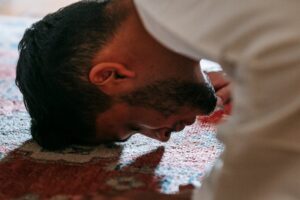The rituals of Hajj might be the most Islamic practices based on total submission without many people understanding the reasoning or wisdom behind it. And perhaps it’s meant to be just like that, especially since there are no direct verses in the Quran and Sunnah that directly specifies a logical meaning.
In the few lines below, I will touch on some of the main rituals that are practiced during Hajj and try to explain some of the wisdom behind them.
All Rituals are under Taqwa
The general idea that has always been assured in the acts of worship is that it centers on being of one main outcome – God Consciousness or Taqwa. Regarding Hajj, Allah (SW) said: {And whoever honors the prescribed rituals [and waymarks] of God- then, indeed, it is out of the fear of God in [their] hearts.} 22:32. The concept of having Taqwa is not based on God benefitting from any of our acts, for He (SW) is not negatively affected from our sins nor positively affected from our good deeds, but rather, Taqwa is meant to shape us to be better, to be free from harming ourselves or people around us.
Ihram
Most people think of Ihram as only the two pieces of white garments that men wear during Hajj. The garment is just a reflection of the idea of Ihram itself, but Ihram really represents the status of sacredness or purity one enters at the beginning of Hajj or Umrah practices.
Ihram is also a status of mind, an intention that one has entered a time and place of sacredness to declare peace within and reflect that on one’s actions and words. Since you are visiting the places declared holy by God, then the best garment is the one that God honors which is of righteousness, while eliminating worldly status by making everyone equal. There is no place in such a sacred place for showing off with designer clothes or perfume or shoes. You are honored by the Taqwa of your heart. {Yet the garment of fearing God- that is the best [of human adornment]} 7:26.
Talbia
The constant repetition of the one statement of Talbia, starting from the moment of Ihram till throwing pebbles at Jamarat on the morning of Eid, is an assurance and a reminder of what Hajj is all about, praising God; “Here I am answering to Your service my Lord. Here I am, answering to You, the One with no partner. All thanks, provisions and ownership (of all that exists) is to You; You have no partners with You.” Allah revealed in the Quran that everything that exists is in a state of praising God: {For there is not a [single] thing but that it exalts Him with [all] praise.} 17:44, and in Talbia this meaning is more assured as the prophet (SAAW) said: “Any Muslim who calls in Talbia, all things around him from his right and left, whether stones, trees and towns until land ends will call in Talbia with him.” Talbia becomes the chanting verse of submission by all declaring Tawheed as the one thing that unites them together.
Tawaf
Tawaf starts by kissing, touching or waving at the Black Stone, a symbol of combining creed with submission to the practices introduced by the prophet (SAAW). It was more like a test to have pilgrims kiss the Black Stone yet associate no holiness towards it, and that was the test of clearing their minds after idols were destroyed, first from their hearts before they were destroyed inside Ka’bah. Omar (RAA) summed up this act by saying: “By Allah, I know you are just a stone that brings no benefit or harm (that was pure Tawheed), and if it wasn’t that the prophet had done it, I would not have kissed you.” (and that was submission)
Going seven rounds around the Ka’bah is an act of remembering the moment of praise and joy that both prophets Ibrahim (AS) and his son Ismaiel (AS) celebrated after raising the Ka’bah. People from all around the world come to repeat these same actions and try to revive such feelings of praise and joy in their hearts in celebration of praise from Ibrahim’s time all the way to our prophet’s time (SAAW), to our own moments around the Ka’bah, leaving one mark after another for generations to unite.
Saie
Saie between Safa and Marwa is meant to awaken the sense of sacrifice within you. As Hajar, Ibrahim’s wife, asked him when he left her alone with her child: “Is it God who ordained you to leave us alone?” to which prophet Ibrahim (AS) answered yes. She said: “Then He (SW) will not let go of us.” It was really a moment of sacrifice based on the trust and submission to the will of God mixed with the natural instinct of seeking means to survive that led her to walk between Safa and Marwa seven times. These steps that Hajar took between Safa and Marwa resulted in the miracle of the well of Zamzam, which continues to flow to this day. Those steps are repeated every year by pilgrims to remind us to sacrifice matters of life when we are tested based on the basic trust in God’s wisdom. And as Hajar enjoyed Zamzam water to save her life and her son’s life, I am sure God will send us our own well of patience and trust and submission.
Arafah
The Day of Forgiveness is the Day of Arafah where people are purified from their sins as fresh as babies born from their mother’s womb. Most people focus on the promise of God’s Mercy showering down on them, and they should for it is the outcome sought. But I always look at people’s status of humility and vulnerability witnessed in their tears and Dua that creates this atmosphere of repentance and peace. A sea of white (garments) as far as the eye can see, millions of pilgrims all together in one place yet each one alone with his Creator. Tawbah is the effort squeezed by the soul for purification. God the Almighty receives these moments of sincerity, and showers forgiveness and peace so people can return to their lives and share this peace with others around them.
Throwing pebbles
Every day of your life you feel the attack from Satan. Throwing the pebbles at Jamarat is the moment when you are on the attack rather than the defense.
When Satan confronted prophet Ibrahim (AS) trying to change his mind from following God’s command, he (AS) was able to resist through the power of his trust in God. By symbolically repeating this act, the pilgrim gains power to trust in God to win his own battles with Satan.
With each pebble, the pilgrim says Allahu Akbar, a reminder that you cannot win such battles against Satan without reliance on God alone. A student of Ibn Al-Qayyim Al-Jawziyyah once asked him how to face Satan. The teacher replied: “If you came across a shepherd with his flock and his dog, and his dog attacked you, what would you do?” The student said: “I would yell at him, throw a rock, or hold a stick to defend myself.” Ibn Al-Qayym said: “You should seek help from the owner of the dog, the shepherd.” And that is exactly what the symbolism of throwing pebbles can help you understand, to seek refuge with Allah against the attacks of Satan.
Hajj Mabroor
I pray that all our community members who are blessed to go to hajj this year will be blessed in their acts of worship and that their hajj is accepted, insha Allah. And I pray for the people who did not go yet that Allah (SW) will make it easy for them to fulfill and enjoy this fifth pillar of Islam.
By Sh Kifah Mustapha




